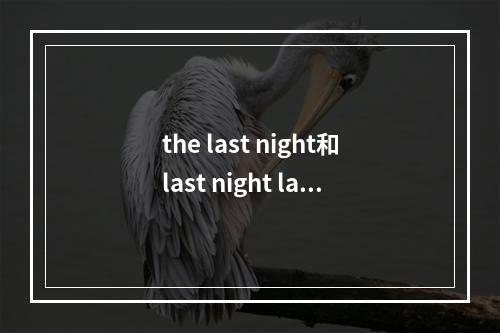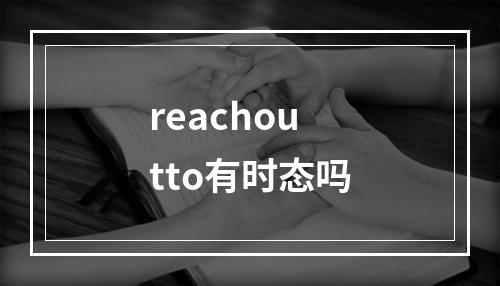the last night和last night last night用什么时态

last night用什么时态
lastnight属于一般过去时态的标志词,一般过去时表示过去某个时间里发生的动作或状态。过去习惯性、经常性的动作、行为。在英语语法中,时指动作发生的时间,态指动作的样子和状态。
含义:过去某个时间里发生的动作或状态,过去习惯性、经常性的动作、行为,过去主语所具备的能力和性格。
小学英语必须掌握的四大时态讲解(附专项练习和答案)
主要描述经常会发生的动作、状态或不变的真理。
句末常出现every day/week/year/Monday , in the morning;句中常有always, usually, often, sometimes
组成
1.主语+be+名词(形容词)
I am a student.
He is tall.
否定句:在be 后加not
I am not a student.
He is not tall.
疑问句:be 动词提前到第一位。
Are you a student?
Yes,I am./No,I am not.
Is he tall?
Yes,he is./No,he isn’t.
组成
2.主语+动词+地点+时间
We go to school on Monday.
He goes to the park on Sunday.
否定句:主语+don’t/doesn’t’t+动词原形+地点+时间
We don’t go to school on Monday.
He doesn’t go to the park on Sunday.
疑问句:在句首加do或does
Do you go to school on Monday?
Yes, we do./ No, we don’t.
Does he go to the park on Sunday?
Yes, he does./ No, he doesn’t.
动词第三人称单数变化
1. 在原单词末尾加s , 如:like – likes
2. 单词以o, sh, ch, s, x 结尾加es, 如:go – goes
3. 单词末尾为辅音+y结尾去y加ies 如:study- studies
现在进行时
主要叙述正在发生的事情。
句末常出现now;句首常出现look, listen。
组成
主语+be +动词ing形式
I am reading English.
They are swimming.
He is playing football.
否定句:在be后加not
I am not reading English.
They are not swimming.
He is not playing football.
疑问句:将be 放到第一位。
Are you reading English?
Yes, I am./ No, I am not.
Are they swimming?
Yes, they are. / No, they aren’t.
Is he playing football?
Yes, he is. / No, he isn’t.
动词变ing形式
1.在动词末尾加ing. 如:play- playing
2. 末尾有e,要去e加ing. 如:ride – riding
3. 末尾以辅音元音辅音结尾,双写末尾的辅音字母.如:swim-swimming
一般过去时
主要描述过去发生的事情。
句末常出现last night/week/Monday/year, yesterday, ago
组成
主语+动词过去式
I was a pilot.
They were busy.
He went to the market.
否定句:在be后加not,在普通动词前加didn’t 动词恢复原形。
I was not a pilot.
They were not busy.
He didn’t go to the market.
疑问句:提前be 动词或在句前加did
Were you a pilot?
Yes, I was./ No, I wasn’t.
Were they busy?
Yes, they were./ No, they weren’t.
Did they go to the market?
Yes, they did. / No, they didn’t.
动词变过去式
1. 在末尾加ed或d 如:play-played、like-liked
2. 辅音加y,结尾去y加ied.如:study-studied
3. 辅音元音辅音结尾双写最后一个字母加ed.如:stop-stopped
一般将来时
主要描述将来要发生的事情。
句末常出现next Monday/week/ year, tomorrow
组成
1.主语+be going to +动词原形
I am going to visit Ann.
They are going to draw a dog.
She is going to ride a horse.
否定句:在be后加not
I am not going to visit Ann.
They are not going to draw a dog.
She is going to ride a horse.
疑问句:将be提前
Are you going to visit Ann?
Yes, I am. / No, I am not.
Are they going to draw a dog?
Yes, they are./ No, they aren’t.
Is she going to ride a horse?
Yes, she is. / No, she isn’t.
组成
2.主语+will+动词原形
I will go to the library.
They will clean the house.
She will eat breakfast at home.
否定句:在will 后加not 或将will not 写为won’t
I will not go to the library.
They will not clean the house.
She will mot eat breakfast at home.
疑问句:将will 提前
Will you go to the library?
Yes, I will./ No, I won’t.
Will they clean the house?
Yes, they will. / No, they won’t.
Will she eat breakfast at home?
Yes, she will. /No, she won’t.
专项练习
一般现在时练习题
一、写出下列动词的第三人称单数形式。
eat read do take wash
watch have carry study f ly
catch go have cook look
sing teach like get come play
二、用单词的正确形式填空:
1. Mike ___________ (do) his homework every day.
2. There ____________ (be) some water in the glass.
3. We like ____________ (play) basketball after class.
4. I like singing. I often ____________ (listen) to the music in the evening.
5. My grandma ___________ (watch) TV every day.
三、选择最佳的答案:
1. ____Alice often play the piano. No, she _____.
A. Do; do B. Does; does C. Does; doesn\t
2. ___ your penfriend __ in Beijing?
A. Do; live B. Do; lives C. Does; live
3. Tom and Mike __ very excited, they will take a trip.
A. is B. are C. am
4. I like ________ very much. What about you?
A. dance B. danced C. dancing
5. I can’t find my pen. Let me __.
A. go and ask her B. go and ask hers C. go and ask she
6. Fangfang is a good student. She ____maths.
A. does good at B. well do it C. is good at
7. The kite ____ a bird. A. look like B. is looking C. looks like
8. Bill and I ___ good friends.
A. is B. are C. am
9. Sandy often ___ his homework on Sundays .
A. do B. does C. did
10. What do you usually do on the weekend? I __________.
A. went swimming B. go swimming C. visited grandparents
11. What do you usually do on your holiday?
A. saw elephants B. sing and dance C.took picture
12. I ____ a student. I go to school ____bus every day.
A. is; by B. am; on C. am; by
13. I ____ a brother. She ____ a sister.
A. have; has B. has; has C. have; have
14. You ____ a student. He ____ a teacher.
A. is; is B. are; is C. are; are
15. He always _____ football games.
A. watches B. watch C. doesnt
16. My best friend _____ shells.
A. collects B. collect C. often
17. She doesn’t _____ listening to the music.
A. often B. like C. likes
18. My mother and I ___ always watch romantic films.
A. doesn’t B. don’t C. do
19. ---When _____ he get home on Friday?
----He gets home at four on Friday.
A. do B. does C. did
现在进行时练习题
一、 写出下列单词的现在分词:
do play dance sit
make swim jump cook
clean watch come read
eat write sing go
run fly catch help
二、用单词的适当形式填空:
1. look! Chen Jie and Mike are ___________(sing)now.
2. The small bear is ________ (climb) the tree.
3. Mike is ________ (draw) picture.
4. She is ________ (do) the dishes.
5. My brother is ________ (make) kites.
6. My father is ________ (read) a newspaper in living room.
7. Ted is __________(answer) the phone.
8. My uncle is ________ (drive) a car.
9. The students are ________(listen) to their teacher carefully.
10. Chen Jie is _________(wash) clothes.
三、 选择正确答案
1. Every one ____ to their teacher in the classroom.
A. are listening B. is listening C. listen
2. They are singing and ___ together at the party now.
A. dance B. danced C. dancing
3. Listen! The birds ____.
A. is singing B. are sing C. are singing
4. Look! The kite ___ in the sky. A. fly B. flies C. is flying
5. They ____ riding a forse. A. is B. are C. am
6. Kate ____ playing chess. A. am B. is C. are
7. Are you washing clothes?
A. Yes, you are B. Yes, I am C. No, I am
8. Is he ____ TV?Yes, he is. A. watch B. watching C. not
9. ____ they taking pictures.? Yes, they are.
A. Am B. Be C. Are
10. It’s 10 o’clock. Ben _____ TV in the bedroom.
A. watch B. is watching C. watches
四、 根据中文填空。
1. Sandy 正在弹钢琴。 Sandy ______ ________ the piano.
2. 听, 她们正在说英语。 Listen, _______ are _______ English.
3.我正在做家庭作业。 I _________ _________ my homework.
4.她正在写信吗? ________she _______a letter?
5. Zhang Peng 和Tom 在树下下棋。
Zhang Peng and Tom ________ ________ chess under the tree.
6. 你们正在植树吗? _______ you ________ trees? Yes, we are.
一般过去时练习题
小学阶段不规则动词的过去式整理:
am is -----was are-----were
begin ----began
ride---rode blow----blew
break----broke bring----brought
run---ran build----built buy----bought
catch---caught say---said
come---came see---saw
draw---drew drink---drank
eat---ate fall----fell
drive---drove sing---sang
do---did fly----flew sit---sat
fight---fought go----went
meet---met sweep---swept
sleep---slept teach----taught
swim---swam take----took
leave---left tell—told write---wrote
know---knew wear---wore
get---got give----gave
have---had make----made
put---put read---read throw---threw
一、写出下列动词的过去式或动词原形。
1.go________ 2.is________ 3.buy________ 4.swim________
5.have ________ 6. watched _________ 7. ate________ 8. got________
9. lived ________ 10. saw ________ 11. spend ________
12. talk ________ 13. do _________ 14. teach ________
15. win ________ 16. like _________ 17. write ________
18. cry ________ 19. study _________ 20. ask ________
二、 用单词的适当形式填空。
1. _____ you ______(water) the flowers yesterday?
2. Su Hai ________(go) for a walk last Sunday.
3. Mike didn’t ________(finish) his homework yesterday.
4. I _______ (pick) apples on the tree last month.
5. I_______(is) ten years old last year.
6. There _______(are) five books on the desk a moment ago.
7. They _______(sweep) the floor just now.
8. I _______ (meet) Miss White the day before yesterday.
10. I _______ (wash) clothes last weekend.
11. What did you you do on your holiday?
I _______ (go) swimming.
三、 选择正确的答案。
1. I ___presents for my parents yesterday. A. buyed B. bought C. buying
2. Susan _____ swimming yesterday. A. go B. goes C. went
3. Danny _____ breakfast five times last week. A. eat B. ate C. eated
4. Last Sunday____ Tree Planting Day. A. is B. were C. was
5. I ____ a lot from our textbook. A. learned B. learnes C. learning
6. We ____ to the zoo and ___ a lot of animals yesterday. A. go; see B. went; saw C. goes; sees
7. What did you do last weekend ? --I _________ A. read a book B. wash the clothes C. go fishing
8. What did you do on your holiday? I ________
A. bought a present B. go skiing C. learn English
9. What did he _____ yesterday? He ____ his homework. A. did; did B. do; did C. do; do
10. Yesterday my presents and I ____ our house. A. were cleaning B. cleaned C. are going to clean
11. What _____ to trees in the different season? A. happen B. happens C. happened
12. Last summer. I ____ in the lake and played on the beach. A. swim B. swam C. will swim
13. Did you eat good food in China? ______. A. Yes, I do B. No, I didn’t C. No, I did
14. We played basketball _____. A. sometimes B. on Saturdays C. last Saturday
一般将来时练习题
重点讲解:
shall / will + 动词原形 (shall 只能用于第一人称)
be going to + 动词原形 (表示打算干什么)
be going to + 地点 (表示准备去)
一、用单词的适当形式填空。
I _______ ________ _______ _______ (see) a film tomorrow.
A: What _______ you _______ ______ _______ (do) next Saturday?
B: I _______ __________ _______ ________(swim) with my parents.
There ______ _______ (be) a party in our school.
Mike _______ ________ (visit ) his grandparents next week.
He ______ ______ _______ _______(buy)a bike the day after tomorrow.
________ (fly)a kite with my father next week.
He will not _________ (go) to school tomorrow.
二、选择正确的答案。
1. I’m going to _____ some chopsticks ____ Sunday afternoon.
A. bought; on B. buy; on C. buy; on
2. When are you going to Hong Kong? I’m going there ____ .
A. this weekend B. by plane C. yesterday
3. I’m going to____ my friends this weekend.
A. visit B. visited C. visiting
4. I’m going to____ homework tomorrow.
A. does B. do C. did
5. Are you going to take a piano class? ____
A. No, we not B. No, I am C. Yes, I am
6. I am ___ eat breakfast at 7:15.
A. will B. going to C. shall
7. We are going to ____ to the park tomorrow.
A. go B. goes C. going
8. What film are you going to ______ ?
A. see B. watch C. look
9. We _____ a play tomorrow. Will you please join us?
A. are going to see B. saw C. sees
10. He ___ a race with Ming Ming.
A. shall have B. will have C. going to have
11. Where _____ you go tomorrow?
A. are B. will C. shall
12. ___ his brother going to climb mountains?
A. Is B. Are C. Am
13. Look! It _____. A. will snowing B. is going to snow C. snows
14. I ____ free this afternoon. A. be B. will be C. going to be
15. They will ____ roast ducks in Beijing. A. ate B. eats C. eat
16. I __ visit my friends this weekend.
A. go to B. am going to C. going to
小学英语时态练习题答案
一般现在时练习题
一、写出下列动词的第三人称单数形式。
eat eats read reads do does
take takes wash washes watch watches
have has carry carries study studies
f ly flies catch catches go goes
have has cook cooks look looks
sing sings teach teaches like likes
get gets come comes play plays
二、 1. is doing 2. is 3. playing 4.listen 5. Watches
三、 1-5 C C B C A 6-10 C C B B B 11-15 B C A B A
16-19 A B B B
现在进行时练习题
一、写出下列动词的现在分词形式。
do doing play playing dance dancing
sit sitting make making swim swimming
jump jumping cook cooking clean cleaning
watch watching come coming read reading
eat eating write writing sing singing
go going run running fly flying
catch catching help helping
二、1.singing 2.climbing 3.drawing 4.doing 5.making
6.reading 7.answering 8.driving 9.listening 10.washing
三、1-5 B C C C B 6-10 B B B C B
四、1.is playing 2.they speaking 3.am doing 4. Is writing
5.are playing 6.Are planting
一般过去时练习题
一、写出下列动词的过去式或动词原形。
1.go went 2.is was 3.buy bought 4.swim swam
5.have had 6. watched watch 7. ate eat 8. got get
9. lived live 10. saw see 11. spend spent
12. talk talked 13. do did 14. teach taught
15. win won 16. like liked 17. write wrote
18. cry cried 19. study studied 20. ask asked
二、用单词的适当形式填空。
1. Did you water (water) the flowers yesterday?
2. Su Hai went (go) for a walk last Sunday.
3. Mike didn’t finish (finish) his homework yesterday.
4. I picked (pick) apples on the tree last month.
5. I was (is) ten years old last year.
6. There were (are) five books on the desk a moment ago.
7. They swept (sweep) the floor just now.
8. I met (meet) Miss White the day before yesterday.
10. I washed (wash) clothes last weekend.
11. What did you you do on your holiday?
I went (go) swimming.
三、选择正确的答案。
1-5 B C B C A 6-10 B A A B B 11-14 C B B C
一般将来时练习题
一、用单词的适当形式填空。
1.am going to see
2.are going to do am going to swim
3.will be 4.will visit
5.is going to buy
6.will fly 7.go
二、选择正确的答案。
1-5 C A A B C
6-10 B A A A B
11-16 B A B B C B
我是超人老师,每天为大家更新小学、初中资料。如果觉得好的话,记得关注我哦。
初中英语语法八大时态 一.一般现在时
一.一般现在时
1. 结构
肯定句式: 主语+动词原形/动词的第三人称单数+其他
否定句式: 主语+(助动词) don't/doesn't +动词原形+其他
一般疑问句式: Do/Does+主语+动词原形+其他
简略回答: (肯)Yes,主语+do/does (否)No,主语+do/does not
缩写形式: don't = do not doesn't = does not
例句:He often goes swimming in summer.
I usually leave home for school at 7 every morning.
2.用法
1)表示经常的、习惯性的动作或存在的状态,常与表示频度的副词连用。
常用的频度副词有: always、often、 usually、seldom、never、sometimes, every week (day, year, month…), once a week, on Sundays.频度副词在句中通常放在行为动词之前,系动词、助动词之后。
例如: He often goes swimming in summer.
I usually leave home for school at 7 every morning.
2)表示主语具备的性格、特征和能力等。
例如:All my family love football .
My sister is always ready to help others .
Ann writes good English but does not speak well.
3)表示客观真理、客观存在、自然现象。
例如:The earth moves around the sun.
Shanghai lies in the east of China.
4)表示按计划或安排好的,或将要发生的动作,可用一般现在时表将来。
但只限于start,begin,leave,go,come,arrive,return,take place等。
例如:The train leaves at six tomorrow morning.
He comes back tonight.
5)在复合句中,当主句是一般将来时,时间或条件状语从句的谓语动词只能用一般现在时来表示将来要发生的动作。
例如: I'll tell him the news when he comes back.
If you take the job , they will talk with you in greater details.
二.一般过去时态
1. 结构
肯定句式: 主语+动词过去式+其他
否定句式: 主语+(助动词)didn’t +动词原形+其他
一般疑问句式: Did+主语+动词原形+其他
简略回答: (肯)Yes,主语+did (否)No,主语+did not
基本结构
否定句
一般疑问句
Be动词
was/were+not
was/were提前,放于句首
行为动词
didn’t+do(动词原形)
Did+主语+do(动词原形)
2.用法
1)表示过去某一时刻或某一段时间里所发生的动作或情况。常和表示过去的时间状语yesterday, just now, the other day, in 1982, ago, an hour ago, long long ago, the day before yesterday, last week(year, night, month…), at the age of 5, one day, once upon a time等连用
例如:Where did you go just now?
After a few years, she started to play the piano.
2)表示在过去,经常或反复发生的动作。常与often,always等表示频度的副词连用。
例如:When I was a child, I often played football in the street.
我是个孩子的时候,常在马路上踢足球。
3)一般过去式也可与today,this week,this month,this year等表现在的时间状语连用,但这些时间状语须指过去的时间,决不包含“现在”“此时此刻”的意思。
例如:Did you see him today?今天你看见他了吗?
三.一般将来时
1. 结构
结构1:
肯定句式:主语+助动词will+动词原形+其他
否定句式:主语+助动词will+动词原形+not+其他
一般疑问句式:助动词Will+主语+动词原形+其他
简单回答:在口语中,will在名词或代词后常缩为’ll,wii not常简缩为won’t。
在疑问句中,主语为第一人称时(I和we)时,常用助动词shall。
例如:She’ll go to play basketball.
Shall we go to the zoo?
结构2:
肯定句式:主语+be going to +动词原形+其他
否定句式:主语+be not going to +动词原形+其他
一般疑问句式:Be+主语+going to+动词原形+其他
简略回答:(肯)Yes,主语+be (否)No,主语+be not
2.用法
1)表示将来某个时间要发生的动作或存在的状态,常与tomorrow, next day(week, month, year…), soon, in a few minutes, by…, the day after tomorrow等连用。
例如:I'll meet you at the school gate tomorrow morning.
2)、表示说话人对于将来的看法、假设和推测,通常用于be afraid, be/feel sure, hope, know, think等后面的从句或与副词perhaps,possibly,maybe等连用。
例如:I think she’ll go back home for supper.
Maybe she’ll go to the gym.
将来时其他表示法
1)be going to表示将来
表示说话人的打算、计划、安排或根据迹象判断必然或很可能发生的事情。
例如:What are you going to do tomorrow?
The play is going to be produced next month。
注意:be going to 和will之间的区别。
l 在时间上:be going to通常表示马上要发生或相当快就要发生的事情;而will不指明任何具体时间,可以指遥远的未来。
He is going to be better.
He will be better.
l 计划/临时:两者都表示意图时,be going to含有预先计划、准备的意思;will则指未经过预先思考或计划,是临时的一种决定。
— What are you going to do next Sunday?
— I'm going to go fishing.
— Where is the telephone book?
— I'll go and get it for you.
l 两者都用于预测时,be going to意指有迹象表明某件事将要发生,属客观的推测;will则意指说话人认为/相信某件事将要发生,属主观的推测。
l 在条件状语从句中,be going to表将来,will表意愿。
例如:If you are going to make a journey, you'd better get ready for it as soon as possible.
Miss Gao will tell you the answer if you ask her.
2)“be to+动词原形”表示客观安排或受人指示而将要做某事。
例如:We are to discuss the report next Saturday.
3)be about to +动词原形,意为马上做某事。不能与tomorrow, next week 等表示明确将来时的时间状语连用,多于when引导的时间状语连用。
例如:He is about to leave for Beijing.
四.现在进行时
1. 结构:
am/is/are+动词的现在分词
2. 用法:
1)表示现在(指说话人说话时)正在发生或进行的动作。常与now, right now, at this moment, at this time, these days等时间状语连用。注:如果句首有警示性动词look、listen等,主句的动词也与现在进行时连用。
例如:We are waiting for you now.
Listen! The bird is singing in the tree.
2).表示现阶段(说话前后一段时间内),一直在进行的活动。说话时动作未必正在进行。
例如:Mr. Green is writing another novel. 他在写另一部小说。(说话时并未在写,只处于写作的状态。)
He is thinking about this problem.这些天来他一直在考虑这个问题。
3).表示反复发生的动作或持续存在的状态,常与always, constantly, forever 等词连用,往往带有说话人的主观色彩。
例如:You are always changing your mind.
4).表示尚未完成的渐变过程,这样的动词有:get, grow, become, turn, run, go, begin等。
例如:The leaves are turning red.
It's getting warmer and warmer.
5)、表示移位的动词,如go,come,leave,start,arrive等,其现在进行时可表将来。
例如:I'm leaving tomorrow. 明天我要走了。
The train is arriving soon. 火车要到了。
注:不能用进行时态的动词
类别
举例
感官类
See,look,smell,hear,taste,notice,feel
感觉类
Love,agree,like,hate,want,fear,wish,prefer
认知类
Believe,think,understand,forget,remember
存在类
Appear,exist,lie,remain
占有、从属类
Have,own,contain,belong,possess,consist of
短暂动作类
Accept,receive,admit,decide,promise,give,finish
五.现在完成时
1. 结构:
肯定句:主语+助动词have(has)+动词过去分词-ed
否定句:主语+助动词have(has)+not(haven’t,hasn’t)+动词过去分词-ed
一般疑问句:Have(Has)+ 主语+动词过去分词-ed+?
特殊疑问句:疑问词+have(has)+ 主语+动词过去分词-ed+?
2.用法
含义:现在完成时用来表示现在之前已发生或完成的动作或状态,但其结果却和现在有联系, 也就是说, 动作或状态发生在过去但它的影响现在还存在。
1)现在完成时往往同表示不确定的过去时间状语连用, 如already, yet, just, before, recently, lately等
Mr. Wang has just come back from America. 王先生刚从美国回来。
I haven’t seen much of him recently (lately).
We have seen that film before.
Have they found the missing child yet?
现在完成时中的时间状语:
★already通常用于肯定句中,意为―已经,位于行为动词之前, be动词、助动词之后。有时可放在疑问句句尾,表示惊讶。
例如:We have already cleaned the classroom.
Have you finished it already?
★yet用于疑问句中表示―已经;用于否定句中,表示还(没)。
例如:—Has he found his watch yet?他还没找到他的表吗?
—No, not yet. 是, 还没有。
★ever意为曾经,常用于疑问句或否定句中,位于助动词和过去分词之间,表示从过去到目前为止的时间。
例如: Have you ever been there?你曾经去过那里吗?
Nothing has ever happened here. 这里未曾发生过什么事。
★never意为(曾经)从未、没有, 是否定副词,在句中位于助动词和过去分词之间。ever与否定词not连用相当于never。例如:
I haven’t ever spoken to her. = I have never spoken to her. 我从未跟她讲过话。
★just意为―刚刚, 用于现在完成时, 表示行为刚刚过去, 位于助动词与过去分词之间。
e.g. He has just come back from school.他刚从学校回来。
★ just now意为―刚才, 表示过去某时, 用于一般过去时, 位于句首或句尾均可。
e.g. He came from school just now.他刚才从学校回来。
★for 和since的用法及区别。for 与一段时间连用,since 与时间点连用。注意:since 后接过去时的时间状语或过去时的句子。
e.g. I have been to Shanghai twice since 1970.
I haven’t seen her since she left Shanghai.
I saw Ping Ping six years ago. Since I havenever seen her.
★have/has gone to、have/has been to 和have/has been in的区别。
have/ has gone to 去了,在去某地的路上或在某地, 人还未回来
have/ has been to 曾经去过, 人已经回来了
have/ has been in 已经在, 常与一段时间连用
e.g. She has been to Shanghai before. 她以前曾去过上海。
She has been in Shanghai for ten years. 她在上海10年了。
Has he gone to Qingdao? 他去青岛了吗?但不能说 Have you gone to Qingdao?
2)、现在完成时还可用来表示过去发生的动作一直延续到现在,常带有for或since 等表示一段时间的状语。
如:Mr Wang has lived here since 1983.
I haven’t seen much of him recently (lately).
We have seen that film before.
Have they found the missing child yet?
3)、现在完成时瞬间动词即终止性动词不能与表示一段时间的状语连用。
常见终止性动词与延续性动词 (或状态动词) 的对应关系如下:
come / go / arrive / get / reach / move--- be in/at
open --- be open die --- be dead
close --- be closed become ---be
borrow --- keep put on --- wear
buy --- have leave ----- be away (from)
begin / start ----- be on fall asleep ---- be asleep
end/finish ----- be over catch a cold ----- have a cold
join the army ---- be in the army, be a soldier
join the Party---- be in the Party , be a Party member
例:吉姆买这支已有两年了。
Jim bought this pen two years ago.
Jim has had this pen for two years.
Jim has had this pen since two years ago.
Jim has had this pen since 2007
It is two years since Jim bought this pen.
4).在表示“最近几世纪/ 年/ 月以来……”时间状语中,谓语动词用现在完成时。
in the past few years/months/weeks/days;over the past few years; during the last three months; for the last few centuries, through centuries; throughout history 等
5).表示“第几次做某事,”或在 “It is the best (worst, most interesting ) +名词 +that” 后面跟现在完成时。
例:This is my first time that I have visited China.
This is the most interesting film I have ever seen.
That is the only book that he has written.
6)have / has been to + 地点 意为“曾去过某地”,暗含目前已不在该地仅表示当事人的一种经历而已。
have / has gone to + 地点 “到了某地去了”,暗含“已离开原地去了某地”之意,但是否到达了某地尚不确定。
如:He has gone to Shanghai. 他去了上海。
He has been to Shanghai. 他去过了上海。
六.过去完成时
1. 结构:
助动词had+动词过去分词
2. 用法:
1)、表示在过去某一时间或动作以前已完成的行为或存在的状态。即发生的时间是过去的过去。常与“by the end of/by/before+过去时间”构成的短语连用。
例如:The train had already left before we arrived.
He said that he had learned some English before.
By the end of last term, we had learned five English songs.
2)表示在过去某一动作之前就已经发生或完成了的动作;常用when,before,after等引导的从句作为动作发生时间先后的对比,先发生的动作用过去完成时,后发生的动作用一般过去时。
When I got to the railway station, the train had already left.
当我到达火车站时,火车已经开走了
His father had worked in a TV factory for five years before he came here.
爸爸来这之前,在一家电视机厂工作了5年。
3)表示过去未曾实现的计划、愿望等。这种用法中常用的动词为hope, want,plan,wish, expect, think, intend, mean, suppose等。
例如:We had hoped that you would come, but you didn't. 那时我们希望你能来,但是你没有来。
I had thought that all knew about it.我以为他们都知道这件事呢。
七.过去进行时
1. 结构:
was/were+动词的现在分词(--ing)
2.用法:
1)表示过去某一时刻或某一段时间正在进行或发生的动作。动作发生的特指时间常用一个短语或时间状语从句来表明,如:at this time yesterday,at 7:00 yesterday ,last night ,from seven to nine ,at that time以when或while引导的时间状语从句等。
My family were watching TV at that time yesterday.
When I arrived,Tom was talking on the phone.
What were you doing at 9:00 o’clock yesterday morning.
注意:(1)以when引导的时间状语从句中,从句动作,主句用过去进行时,表示一个动作发生时,
另一个动作正在进行。
When he called me , I was having dinner .
(2)以while引导的时间状语从句中,从句与主句的动作在过去某一时刻同时进行,while常
译为“当……的时候,同时”。
Tom was doing his homework while his sister was watching TV .
2)、表移动的动词,如come, go, arrive, leave, start, begin, return等词的过去进行时,可以表示过去将要发生的动作。
例如:She told me that she was going to Hainan for her holiday.
八.过去将来时态
表示过去的某时以后将要发生的动作。但这个"将来"时间绝不会延伸到―现在;而仅限于―过去时间区域内。由此可以看出,含这个时态的句子常带一个表示―过去某个时间点的状语。这个状语或是一个短语,或是一个句子。这个时态常用于:
1.结构
a)would/should+动词原形
b)was/were going to+动词原形
2.用法
1)、表示从过去某时看将要发生的动作或存在的状态。常用于主句是一般过去时的宾语从句或间接引语中。
例如:He said that he would finish his work before 9 o’clock.
他说他会在九点之前完成工作。
When I thought about it , I wondered what their reaction would be .
当我考虑这件事时,我想知道他们的反应是什么。
2)、表示过去的某种习惯性动作,只能用would。
例如:Whenever he has been in trouble, we would give him a hand.
每当他遇到困难时,我们总会伸出援助之手。
3)表示过去情况中的―愿望、―倾向,多用于否定句。
No matter how difficult the work was , he would keep on doing it until he accomplished it .
不管工作有多难,他总会坚持不懈地把它干完。
They knew that we would never permit such a thing.
他们知道我们绝不会允许发生这样的事。
Even after the lecture ended, the audience would not leave .
甚至在讲座结束之后,听众仍不肯离去。
选择
1. The population of the world ____ still ____ now. (2009·甘肃兰州)
A. has; grown B. is; growing C. will; grow D. is; grown
2. ---Good evening. I _______ to see Miss Mary. (2009·甘肃兰州)
---Oh, good evening. I’m sorry, but she is not in.
A. have come B. come C. came D. had come
3. — It’s time for dinner. Where is your father, Emma?
— He ______ his bike in the yard. (2009·新疆阜康)
A. clean B. cleaned C. is cleaning D. will clean
4. If you carefully, you the report well. (2009·广州)
A. will listen; will be understood B. will listen; understand
C. listen; will understand D. listen; understand
5. They about eight hundred English words by the end of last term. (2009·广州)
A. will learn B. had learned C. are going to learn D. have learned
6. —How did the accident happen? (2009·广州)
—You know, it difficult to see the road clearly because it .
A. was; was raining B. is; has rained
C. is; is raining D. will be; will rain
7. Attention, please. There a football game between China and Korea this evening.
A. is going to be B. has been C. has D. will have
8. —What does your sister like doing in her spare time?
—She watching TV. (2009·湖北武汉)
A. likes B. liked C. has liked D. had liked
9. —When Jessy to New York?
—Yesterday. (2009·湖北武汉)
A. does; get B. did; get C. has; got D. had; got
10. —How clean the bedroom is! (2009·湖北武汉)
—Yes, I am sure that someone it.
A. cleans B. cleaned C. has cleaned D. had cleaned
11. My friend ______ me. I have to leave now. (2009·河北)
A. waits for B. waited for C. is waiting for D. was waiting for
12. Be sure to let Tom know the notice as soon as he ______.(2009·河北)
A. will arrive B. was arriving C. arrives D. arrived
13. I ______ the wrong thing. Can I use your eraser? (2009·河北)
A. write B. wrote C. am writing D. will write
14. ---Are you going to help John with his Chinese this evening? (2009·山东威海)
---NO, He ______ to England. He will be back next month.
A. returned B. has returned C. returns D. will return
15. ---Who’s won the first prize in the competition? (2009·山东烟台)
---Henry______ . He has ______ it for a week.
A. is, won B. is, got C. has, had D. has, been given
16. ---Is this the place that you ______ ? (2009·四川成都)
---No. I’ve never been there before.
A. have visited B. will visit C. are visiting D.would visit
17. It ______ outside. You’d better take an umbrella with you. (2009·江西)
A. rains B. is raining C. rained D. has rained
18. ---Can I help you? (2009·江西)
---I bought this watch here yesterday, but it ______ work.
A. won’t B. didn’t C. doesn’t D. wouldn’t
19. I used to love this film when I was young, but I ______ it that way any more. (2009·江苏南京)
A. don’t feel B. didn’t feel C. haven’t felt D. hadn’t felt
20. ---How was your trip to the ancient village? (2009·湖北宜昌)
---Fantastic! We ___________to a museum of strange stones.
A. go B. went C. are going D. will go
21. —Where is Peter? (2009·湖南娄底)
—He volleyball with his friends in the school gym.
A. plays B. played C. is playing D.was playing
22. ---Hello! Can I speak to Mr. White? (2009·江苏无锡)
---Sorry, he isn’t here right now. He ______ to the theme park.
A. will go B. was going C. has gone D. has been
23. ---______ you ______ your drawing? (2009·陕西绥德)
---Not yet! It will be done in a few minutes.
A. Did; finish B. Will; finish C. Do; finish D. Have; finished
24. She ______ as an animal trainer since 2003. (2009.北京)
A. has worked B. works C. will work D. have worked
25. They ______ her to the party, so she was very happy. (2009.北京)
A. invite B. invited C. will invite D. are inviting
26. Mr. Green ______ to the manager now. You’d better call him later. (2009.北京)
A. talk B. talked C. is talking D. was talking
27. Prison Break is the best American TV play that I ______ these years. (2009.安徽)
A. watch B. will watch C. have watched D. was watching
28. ---Alice, turn down the TV, please. I _________ on the phone.
---Oh, sorry. (2009.安徽)
A. have talked B. talked C. am talking D. talk
29. --- Where are the Greens, may I ask? (2009·吉林通化)
--- Well, they ______ to England. They have been there for nearly a week now.
A. have been B. are going to C. have gone D. will go
30.The teachers_______ the office for a few minutes when we arrived. We didn’t meet them.
A. had been away from B. had left C. have been away from D. have left
想要获得此答案,关注并私信我“英语”获取












